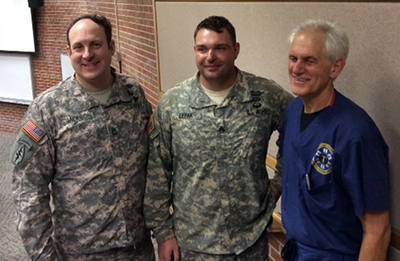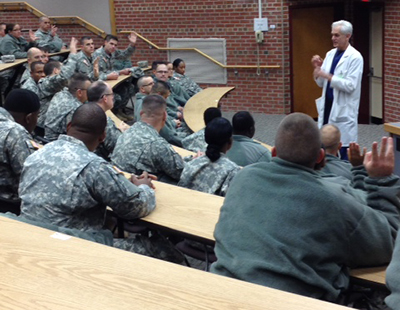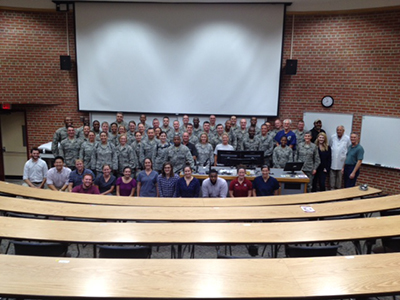EXSC Clinical Professor Paul Beattie leads Doctor of Physical Therapy and School of Medicine efforts to help train chaplains for the armed forces
February 22, 2016

Paul Beattie (far right) with co-instructors SFC Mike Jackson and SSGT Matt Lepak

Paul Beattie shares his physical therapy and combat experiences with the candidates.

The chaplain candidates visit USC for instruction from faculty and students.
In the summer of 1970, Exercise Science Clinical Professor Paul Beattie was just 19 years old and a newly enlisted Army soldier on a remote firebase in South Vietnam when a last minute change in his fighting position saved his life and made him determined to make it a meaningful one. A couple days later, he stumbled upon a dusty brochure promoting healthcare careers. Physical therapy struck a chord with the New York native and with the help of his high school guidance counselor, he arranged to take his college entrance exam while still deployed. “A few months later I took the SAT, sitting on my flak vest, with my M-16 rifle, 200 rounds of ammunition, and a few hand grenades nearby,” Beattie says.
Shortly after arriving stateside the following spring, Beattie interviewed for the new physical therapy program at Quinnipiac College. He enrolled in the program that fall and took on his first job as a physical therapist at Manhattan Veterans Hospital after he graduated in 1975. One of his first patients was a World War II veteran who had survived the Bataan Death March and had been a Japanese prisoner of war for three years. The retired postal worker had recently had his leg amputated but was determined to dance at his daughter’s wedding in three months’ time.
“Due to his overall health, he was a poor candidate for a prosthetic leg, but he convinced us to give him a chance and, sure enough, he learned to walk with it and danced at his daughter’s wedding,” says Beattie. “At that moment, I was the physical therapist in the dirt-covered brochure—the rightness of my path had been indelibly confirmed.”
Fast forward 40 years, and Beattie has four decades of physical therapy practice and research experience along with a master’s degree in Orthopedic Physical Therapy (Medical College of Virginia) and a doctoral degree in Exercise Science (University of New Mexico). Throughout this time, the Worthingham Fellow has remained committed to helping veterans. These days it’s most notably through his work with the Armed Forces Chaplaincy Center.
For the past six years, faculty and students from the Arnold School’s Doctorate in Physical Therapy program and the School of Medicine have partnered to provide a unique training opportunity for Army and Air Force students at the Center. Located at Fort Jackson about 15 minutes from USC’s main campus in Columbia (10 from the School of Medicine), the Center houses the U.S. Army Chaplain Center and School, the Air Force Chaplain Service Institute and the U.S. Naval Chaplaincy School and Center.
Within these three schools, which are coordinated under the overarching Armed Forces Chaplaincy Center, soldiers from a wide range of backgrounds receive their military ministry training to become chaplains for the armed forces. Beattie serves as the primary point of contact for USC and has designed the training to provide chaplain candidates with skills that will help them support wounded, injured and emotionally distraught individuals in dangerous battlefield environments.
This critical component of the curriculum takes place near the end of the session and is centered on a visit to the School of Medicine’s Gross Anatomy Lab, which is directed by Clinical Associate Professor Erika Blanck, who also leads the School’s Gift of Body Program. Within the lab, faculty and students from the Doctor of Physical Therapy session conduct interactive sessions—providing an opportunity for chaplain candidates to observe and feel cadaveric tissues as a way to familiarize themselves with wounds that they may encounter in the field. Sargent First Class Mike Jackson, an Army Special Forces (i.e., Green Beret) Medic from Fort Bragg, also offers a review and demonstration of Basic Combat Life Support techniques.
Immediately following the lab sessions, all of the participants meet in a large classroom to reflect on their experiences. Military combat veterans, including Beattie and Jackson, describe their battlefield experiences and illustrate the ways in which chaplains play key roles.
“Chaplain candidates who have participated in this event consistently rate it as one of the key experiences in their training,” says Beattie. “The actions of USC graduate students, faculty and other volunteers who offer this important training illustrate one of many ways in which the University helps provide a valuable service to our community and to our nation.”



_01.jpg)
_02.jpg)